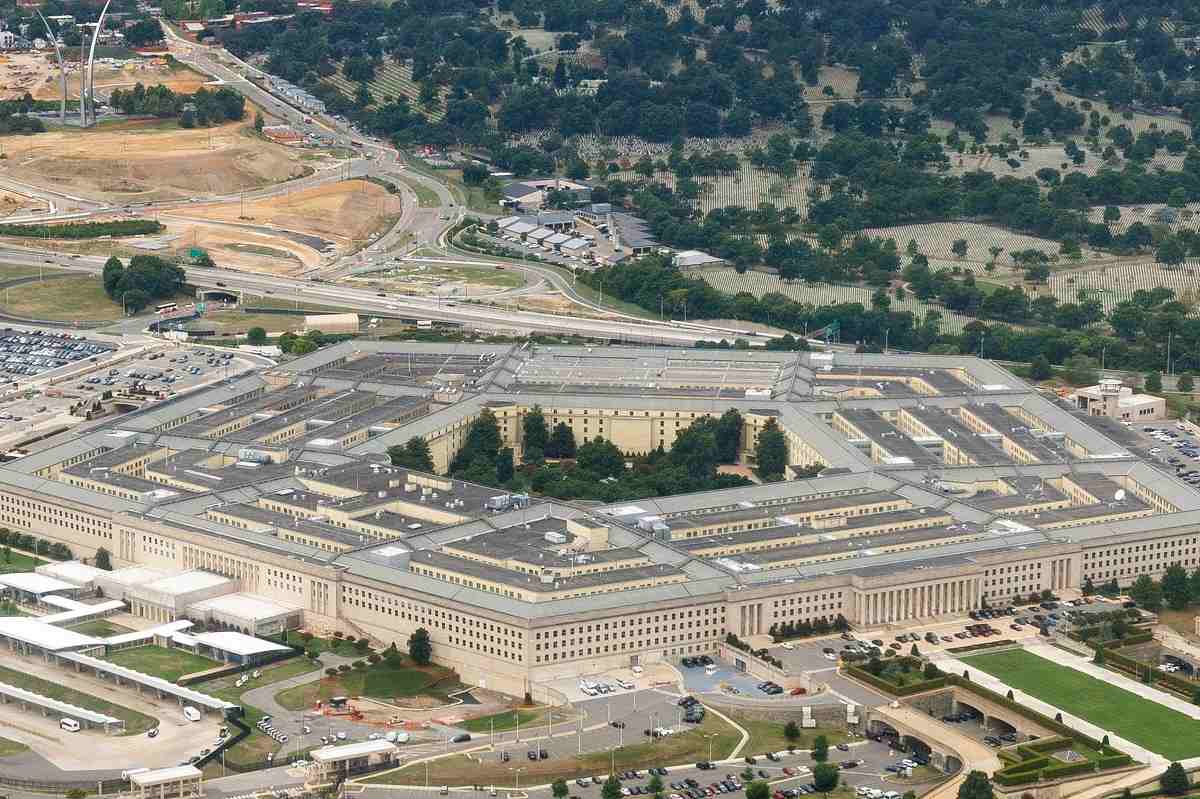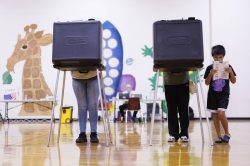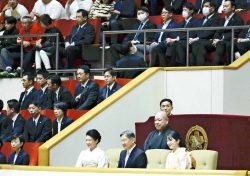
The Pentagon.
13:44 JST, October 16, 2024
Hundreds of veterans kicked out of the armed forces because of their sexual orientation under “Don’t Ask, Don’t Tell” have been given honorable discharges, the Defense Department said Tuesday.
About 820 service members in the Army, Navy, Air Force and Marine Corps had their less-than-honorable discharges upgraded after a review that lasted more than a year. Defense Secretary Lloyd Austin announced the review in September 2023, promising to “to do right by our outstanding service members, military families, and employees” after LGBTQ+ service members were for decades not only forced out of the military because of their sexual orientation but also deprived of the benefits they had earned.
“Brave LGBTQ+ Americans have long volunteered to serve the country that they love,” Austin said Tuesday in a news release, adding that the Defense Department “has taken extraordinary steps to redress the harms done by ‘Don’t Ask, Don’t Tell’ and other policies on these former Service members.”
The “Don’t Ask, Don’t Tell” policy, which prevented the military from asking about sexual orientation but also forbade service members from making it public, was in place from 1994 until its repeal in 2011. The military forced out more than 13,000 troops in those 17 years under the policy. Although most of those service members were honorably discharged, nearly 2,000 of those discharges were characterized as less-than-honorable, depriving service members of a career and some benefits as they were ejected into civilian life.
The change announced Tuesday will unlock veterans benefits that had been denied to those service members because of their discharge status, the news release said. Those could include pensions, money from the GI Bill, home loans, health care and disability compensation.
“It really can make a huge difference,” Renee Burbank, the ligation director for the National Veterans Legal Services Program, told The Washington Post.
Terrence Hayes, a spokesman for Veterans Affairs, said in an email that the department is contacting veterans who received honorable discharges Tuesday.
“We will work with each individual to ensure they are getting the full suite of health care and benefits they deserve,” Hayes said.
Adam Farina, another VA spokesperson, said service members are eligible for benefits based on their service history and health conditions. In an email, he encouraged former service members who faced discrimination and don’t have honorable discharges to apply for VA benefits.
Some advocates for LGBTQ veterans weren’t entirely thrilled with Tuesday’s news. Burbank said there are still many LGBTQ veterans with less-than-honorable discharges who deserve full benefits.
Peter Perkowski, an attorney at Harvard Law School’s veterans legal clinic, said the military still hasn’t offered a substantial apology for its treatment of LGBTQ service members.
“I appreciate that 824 people got some relief today,” Perkowski said. “But there’s still a lot of work to be done.”
Josh Seefried, a former Air Force captain who disclosed that he was gay after the “Don’t Ask, Don’t Tell” policy was lifted, said the discharge upgrades don’t compensate some LGBTQ service members and veterans, such as those who died by suicide after being shamed by the policy. Research has found that LGBTQ veterans are more likely to attempt suicide than other veterans.
Brian Bond, the chief executive of the LGBTQ+ advocacy group PFLAG, said that honorable discharge upgrades will “never completely remove the pain and the trauma” of veterans but that the military sent a “clear message of inclusion” Tuesday.
At the start of his administration in the early 1990s, President Bill Clinton envisioned “Don’t Ask, Don’t Tell” as the end to nearly eight decades of discrimination against LGBTQ members of the armed forces. Up to that point, more than 100,000 people had been kicked out of the military because of their sexual orientation since Congress first banned sodomy in the 1916 Articles of War.
Clinton promised to change that policy until a Military Working Group concluded that homosexuality was inconsistent with military service. The president settled on a compromise: Gay people could serve, Clinton announced in 1993, but only if they kept their sexuality a secret.
In 2011, the Defense Department lifted the long-standing ban.
Top Articles in News Services
-

Prudential Life Expected to Face Inspection over Fraud
-

South Korea Prosecutor Seeks Death Penalty for Ex-President Yoon over Martial Law (Update)
-

Trump Names Former Federal Reserve Governor Warsh as the Next Fed Chair, Replacing Powell
-

Suzuki Overtakes Nissan as Japan’s Third‑Largest Automaker in 2025
-

Japan’s Nikkei Stock Average Alls from Record as Tech Shares Retreat; Topix Rises (UPDATE 1)
JN ACCESS RANKING
-

Univ. in Japan, Tokyo-Based Startup to Develop Satellite for Disaster Prevention Measures, Bears
-

JAL, ANA Cancel Flights During 3-day Holiday Weekend due to Blizzard
-

Japan Institute to Use Domestic Commercial Optical Lattice Clock to Set Japan Standard Time
-

China Eyes Rare Earth Foothold in Malaysia to Maintain Dominance, Counter Japan, U.S.
-

Japan, Qatar Ministers Agree on Need for Stable Energy Supplies; Motegi, Qatari Prime Minister Al-Thani Affirm Commitment to Cooperation

























